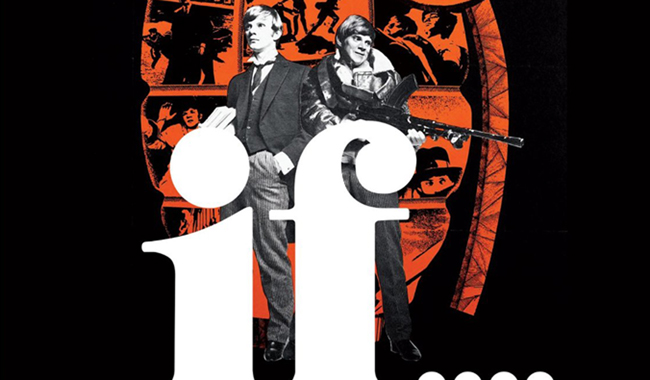
If… Blu-ray Review
 There are many films which capture the zeitgeist of their time. In the US there were such films as The Graduate (1967), Midnight Cowboy, Easy Rider (both 1969) and Zabriskie Point (1970), while in France there were the films of Jean-Luc Godard that caught the revolutionary student rebellion spirit with such films as Weekend (1967) and later the films of Luis Bunuel. But in Britain it was two films particularly that caught the spirit of the age: the first was Blow Up (1966) and the other has just been re-released in Eureka’s wonderful Masters of Cinema series: Lindsay Anderson’s If… made in 1968. Perhaps no other country could capture the spirit of the age and centre it around a public school like a British film.
There are many films which capture the zeitgeist of their time. In the US there were such films as The Graduate (1967), Midnight Cowboy, Easy Rider (both 1969) and Zabriskie Point (1970), while in France there were the films of Jean-Luc Godard that caught the revolutionary student rebellion spirit with such films as Weekend (1967) and later the films of Luis Bunuel. But in Britain it was two films particularly that caught the spirit of the age: the first was Blow Up (1966) and the other has just been re-released in Eureka’s wonderful Masters of Cinema series: Lindsay Anderson’s If… made in 1968. Perhaps no other country could capture the spirit of the age and centre it around a public school like a British film.
The film opens with the new year beginning at a very posh public boarding school (in fact shot at Cheltenham College). There is clearly a social hierarchy going on here in which the teachers allow the prefects to rule over the house ‘scum’ with a corrupted iron fist led by intimidation, bullying and even sexual humiliation. Some of the boys are rebels and begin to rebel further and gain a voice, in particular Mick Travis (a very young Malcolm MacDowell) and his house friends. Travis begins to dream of revolutionary fervour and eventually he, his friends and his girlfriend rise up against the very clearly delineated members of the British establishment and the old order.
Told through a series of chapters, If… is one of the most poignant and experimental films of its day. Financed and pushed by actor Albert Finney of all people and produced by usual character actor and writer Michael Medwin, Lindsay Anderson was eventually able to get backing from Paramount to finance his picture. Anderson only made a handful of feature films and this was his second, his first being the last of the kitchen sink films, This Sporting Life (1963) starring Richard Harris. Clearly through his commitment to putting social politics to the screen and the socially conscious documentaries of his previous 15 years Anderson’s film was going to be clearly marked by politics. With some surrealist touches such as the shot and executed school reverend being pulled out of a draw with the Headmaster forcing the teenage perpetrators forced to apologise to him, a very Bunuelian touch indeed, Anderson was able to produce something very new and fresh. Also on the discs, as well as the myriad of cast and crew members recalling their time on the film, but how sad to see how old and even haggard they look today (MacDowell is not one of those discussing the film but is on the films audio commentary) while sadly Anderson died some years ago. Also on the disc are three very typical shorts by Anderson: one about the manufacturing industry and the other two about disadvantaged children. However, while they may not seem relevant to the film itself, they do represent the social conscience of the director who held strong socialist views and presented that political frustration in an anarchistic way.
If is still a powerful film with the lush colours flatly filmed brought alive on the DVD transfer. The film was shot in both colour and black and white with many having interpreted this mix as very arty, but Anderson always insisted that this was purely for budgetary reasons. Never the less the film is the nearest thing to Bunuel we have in Britain while remaining definitely British in its portrayal of the class system. If indeed.
Chris Hick
